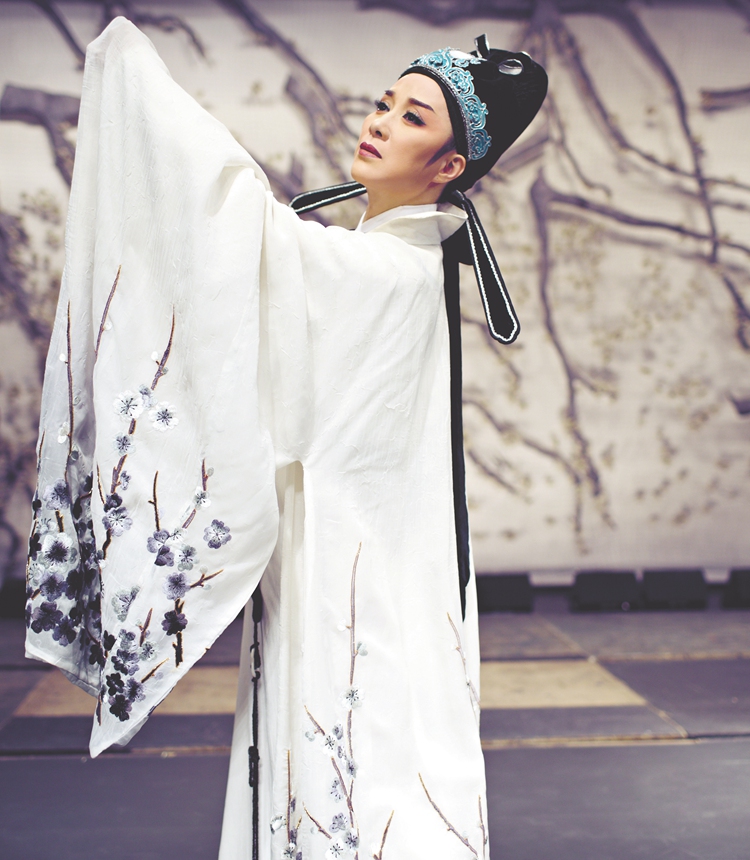By Xu Liuliu
Mao Weitao, a trailblazing figure in Yue Opera, is drivenClassic opera Renaissance by a singular vision: To ensure this centuries-old Chinese art form thrives in the modern era. As a celebrated performer and innovator, she seeks to pass down Yue Opera – a lyrical opera genre from Zhejiang Province – to younger generations while making it a global cultural force akin to Broadway.
Mao’s journey blends reverence for tradition with bold experimentation, exemplified by her groundbreaking work, New Dragon Gate Inn, which ignited a theater-going frenzy in 2023.
“When overwhelming success comes, we must remain calm,” Mao told the Global Times.
“The success of New Dragon Gate Inn isn’t luck – it’s the fruit of innovation. But we can’t stop here. I want Yue Opera to endure like many Broadway classics.”

Yue Opera artist Mao Weitao Photo: Courtesy of Mao Weitao
From tradition to triumph
Yue Opera, known for its poetic story-telling and delicate performances, has long captivated Chinese audiences. Mao, a master of the xiaosheng (young male) role, rose to fame with her portrayal in The Butterfly Lovers, a tragic romance dubbed China’s “Romeo and Juliet.” Her accolades – multiple Plum Blossom, and Wenhua Awards – cemented her status as “the number one female xiaosheng player in Yue Opera.”
Yet, Mao saw the art form faltering against the tide of film, TV, and the internet.
As the head of Zhejiang Xiaobaihua Yue Opera Theatre, Mao proposed the “Butterfly Theater” model, integrating troupe, venue, and operations to revitalize traditional theater. To better carry on such experiments, she became the chairman of Baiyue Cultural and Creative company, pouring her energy into New Dragon Gate Inn.
Facing funding woes, she took a personal loan, vowing to perform in private troupes to repay it if the production flopped. “I believed in our vision,” she said with a broad smile. “We needed works that speak to today’s audiences.”
Her faith was rewarded. Tickets sold out in seconds, and the play has run over 300 times, blending traditional opera with modern flair. Characters like a “slacking” general and the inn owner Jin Xiangyu – echoing the rebellious spirit of the “Nezha” character in animation – struck a chord with young viewers, proving tradition could go viral.
“Just like Nezha’s spirit of helming his own destiny, young people showed their love for Jin Xiangyu,” said Mao.
Preserving Yue Opera soul
Mao’s innovations never stray far away from Yue Opera roots. As a disciple of the Yin School, inheriting the performance style of Grandmaster Yin Guifang, known for tenderness with passion, Mao has a profound understanding of Yue Opera’s cultural genes. She proposed the concept of “three retentions,” which she believes are the keys to maintaining Yue Opera’s unique charm.
In her eyes, the traditional freehand style should be maintained as the Yue Opera’s stage art pursues the freehand style of Oriental aesthetics, with a table and two chairs, traditional backdrops, and virtual performances to create a special artistic conception.
The Zhejiang dialect is the soul of Yue Opera. Although language evolves with the times, the regional official language of Zhejiang Province must be preserved, as “it is an important feature distinguishing Yue Opera from other opera styles,” she noted.
Additionally, the all-women Yue Opera needs to be maintained as the feminine beauty in the ultimate expression of Yue Opera. Although mixed-gender performances can be experimental, the dominant position of female Yue Opera cannot be shaken, she added.
Dialogue with the world
In cross-cultural communication, Mao has own insights and practices. She said that in order to break through language and cultural barriers, Yue Opera needs to actively engage in dialogue with other forms of theater in the world while maintaining its own characteristics.
As early as 2004, Mao led the Xiaobaihua Yue Opera Troupe to adapt and perform Japanese aesthetic master Junichiro Tanizaki’s A Portrait of Shunkin, adapted Bertolt Brecht’s The Good Person of Sichuan into The Good Person of Jiangnan, and combined Shakespeare’s works with Tang Xianzu’s Peony Pavilion to create Coriolanus and Du Liniang.
Yue Opera Coriolanus and Du Liniang combines British playwright William Shakespeare’s tragic play Coriolanus with Chinese Ming Dynasty playwright Tang Xianzu’s masterpiece Peony Pavilion.
These attempts have not only enriched the expressiveness of Yue Opera but also allowed Western audiences to see its unique charm. “Brecht’s performance theory was deeply influenced by Mei Lanfang’s Peking Opera, and our interpretation of his works in the style of female Yue Opera created a wonderful chemical reaction,” Mao recalled.
“When we performed in the UK, the local media was surprised to discover that China had a great dramatist, Tang Xianzu, who was Shakespeare’s contemporary, which enabled equal dialogue between Chinese and Western cultures at the theatrical level.”
Mao’s ambitions extend to nurturing talent and building cultural IPs. She’s spearheading the Gu Xidong Xiqu Art Festival in Xitang, Zhejiang Province, honoring her mentor, Yue Opera pioneer Gu Xidong. His classics, like Lu You and Tang Wan, and Five Daughters Paying Homage to Their Parents, inspire her vision. “Xitang’s Jiangnan charm – white walls, black tiles, flowing rivers – mirrors Gu’s art,” she said. “This festival can showcase Yue Opera and boost cultural tourism in the Yangtze River Delta as a cultural IP marking traditional operas.”
“Yue Opera is a young opera genre, and precisely because it is young, it has more room for innovation,” Mao said.
“I hope we can be as brave as Gu Xidong in changing the history of Yue Opera. In the era of a community with a shared future for mankind, making Yue Opera a voice of the East’s and telling Chinese stories well is the mission of my generation.”













